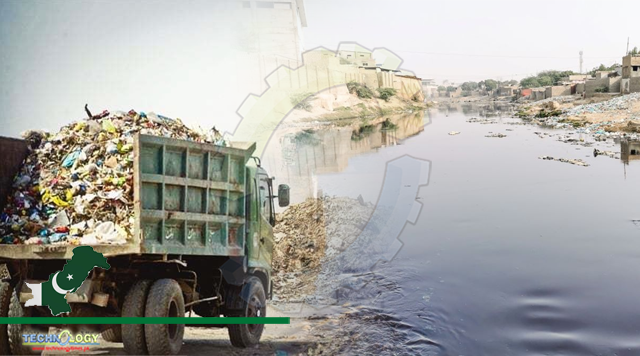Waste management in Pakistan is an increasingly urgent issue around the world. We can learn from the approaches taken in developing countries where the assumptions about the roles of work and dignity are different.

Pakistan is one of the developing countries where waste management relies on government and citizen involvement.
Waste Management in Pakistan
The Pakistani government does not have a comprehensive plan for waste management and most citizens appear unconcerned as waste piles up. Lack of awareness, political will, and inadequate equipment are also hurdles that prevent the development of a proper waste management system.
But unlike developed regions, Pakistan’s lower middle class — about 25% of the Pakistani population — are important contributors in recycling sectors because the majority of them are part of “Kabari culture.” In other words, they are “waste brokers,” helping to reclaim materials for recycling.
The Kabari culture is very common in Pakistan. “Kabari” describes a person who goes from house to house to purchase residents’ recyclable waste, such as plastic, paper, glass, and metals. The Kabari then sell these items to Kabari shops or markets. Recyclers purchase the recyclables from Kabari shops to process them into new raw materials for products.
Scavengers, or waste pickers, perform a similar service, but they collect recycles directly from the trash before selling them to the Kabari shops. In addition, a good portion of the scavengers are children who pick through piles of waste with no protection, exposing them to many health risks.
GarbageCAN: Pakistan’s First Materials Recovery Facility
But now some private companies are working to solve the waste management issue in the nation’s largest city, Karachi. GarbageCAN is Pakistan’s first materials recovery facility (MRF) and it is working to upgrade the Kabari culture to 21st-century recycling standards.
Ahmad Shabbar, the founder and CEO of GarbageCAN is a physicist who is building two platforms: The Environmental as well as GarbageCAN. Previously, he worked on a project with the Texas Space Grant Consortium and NASA while completing college. He returned to Pakistan in 2015 to work in solid waste management.
GarbageCAN’s mission is to make recycling second nature in Pakistan by providing incentives to people who recycle and reduce waste sent to landfills. Shabbar wanted to introduce sustainable practices that enable people to manage their waste properly. He hopes to expand the program throughout Karachi in the near term and nationwide later.
Shabbar articulates three key ideas, which he calls the GarbageCAN ARC (Awareness, Recycling management, Comprehensive waste management):
- Awareness: Build public knowledge about the value of recycling through talks at universities, schools, and offices.
- Recycling management: Provide Kabari services that allow sources of waste, such as restaurants and offices, to contact and schedule the pick-up of recyclable materials.
- Comprehensive waste management: GarbageCAN addresses both recycling and landfill-bound waste to provide convenience to customers. This allows them to sort material for recycling while responsibly disposing of what must be landfilled until viable recycling options are available.
GarbageCAN also takes advantage of opportunities created during the COVID pandemic. For example, the company began to offer disinfection fumigation services to prevent the spread of the virus.
“The technology is still pretty behind in Pakistan, Shabbar said. “Segregation and sorting is done manually.” After sorting of waste, metals are sent to a company that makes motorcycle parts. Some of the plastic goes to a company that recycles it into fiber for use in textiles.
Working To Solve Karachi’s Waste Issues
GarbageCAN is trying to solve Karachi’s waste issues in a way that can be implemented globally, by creating incentives for people to collect and recycle materials. In many developing countries, Kabari culture is already common, so GarbageCAN focuses on adding social media connections to make the process more efficient. And by encouraging youth to join in managing the city’s waste, the company is helping create a recycling and upcycling culture.
To clear the way for innovation, Shabbar suggests that other actions are required as well:
- Focus on developing a People Power movement to engage citizens and influence political leaders.
- A focus on the proper management and disposal of medical waste to establish the value of improved sanitation.
- Making collection bins available at home and in public places to encourage recycling.
- Engage brands that want to sell in the nation to embrace recyclable or compostable packaging.
“To solve the waste management issue, the least we can do is start recycling,” Shabbar said. An analysis of the collection rates among Kabari suggests that they can earn a better living by improving their collection rates, sorting the materials, and finding easier access to resell recyclables to local processors. GarbageCAN collected and recycled 10.175 kg (22,432 lbs.) of plastic, metal, and paper in 2019. In a nation where the median per capita income is $480, 10 tons of recyclables can support a small business.
GarbageCAN plans to expand its services throughout Pakistan. It turns out that reducing waste is easier than recycling it, for now. By creating incentives to reduce the volume of trash, the company is simplifying waste management.
Waste Management Is a Global Issue
While Americans may not be comfortable with the idea of importing Kabari culture, the lesson from GarbageCAN is applicable in any region struggling to improve recycling rates: An incentive, such as a deposit fee imposed by the state on single-use plastic or cans, creates the impetus to organize and respond profitably to the waste challenge.
The reality is that, regardless of the level of economic development, economies have ignored their waste until very recently. Now that society is coming face-to-face with the consequences of making and using things only once, there are new opportunities to create gainful employment if we decide to value waste collection based on its ability to contribute to a sustainable society. The problem is global and requires locally tuned solutions.
Originally published at Earth911